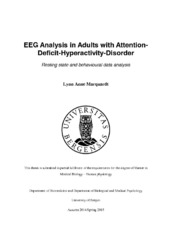| dc.description.abstract | Introduction: Adults with attention-deficit/hyperactivity disorder (ADHD) are examined by electroencephalography (EEG). EEG is a non-invasive method to measure brain activity indirectly, by measuring voltage changes on the scalp. This thesis focuses on EEG signals from relaxed resting, recorded with closed eyes. 8-12Hz alpha is the predominant signal and is analyzed, and we hypothesize that Alpha power is lower and more variable in ADHD. ADHD is a common childhood onset mental disorder (prevalence of about 3-7 % of school children) with symptoms of inattentiveness, impulsivity and hyperactivity. Between 50 – 70 % of patients continue to have symptoms in adulthood. Numerous behavioural studies showed that participants with ADHD have slower response times (RT) compared with control participants. In EEG/event related potentials (ERP) studies, the most consistent EEG findings have been an increased theta/beta ratio. Methods: EEG recordings were performed in three different conditions, during resting state, Flanker task and Oddball task on 59 participants, equally distributed between ADHD patients and controls . The EEG data were analyzed in MATLAB® with EEGLAB by Independent component analysis (ICA) which separates multichannel data and projects it into a source space. The source time series were transformed into power spectra by fast Fourier transform (FFT). The alpha peak was analyzed and correlated with the behavioural data. T-tests were performed in Statistica® for most analyses. Results: Behavioural results showed significant longer maximum RT and slightly lower accuracy for incompatible trials in participants with ADHD. Further, we found trend-significant post error slowing (PES) in participants with ADHD. EEG results showed a marginally but significantly lower parietal alpha frequency in ADHD participants while power did not show significant differences. Significant correlations between EEG and flanker behaviour were found positive for right occipital region between alpha frequency and incompatible RT and incompatible error RT in controls. In the oddball task in the frontal region alpha frequency and RT correlated positively in controls. In the central region incompatible RT and alpha power related negatively in controls. The only correlation for ADHD was negativ , in the central region compatible RT and alpha frequency correlated. Discussion: Overall, there were only few and small differences in the resting EEG between normally developed adults and adults with ADHD. The paucity of significant differences might indicate recruitment bias, the participants that manage to meet and finish the scheduled experiments might belong to a high functioning group of ADHD cases in this study. Conclusion: RT slowing, as found in most studies, was not replicated here, similar with Woltering et.al. (Steven Woltering, Jung, Liu, & Tannock, 2012) Less PES in ADHD was not as obvious as expected from the literature, where the majority of studies find less PES. Alpha power decrease was not found either. More research is needed on ADHD to develop robust EEG markers. Future analyses of behavioral and EEG data from Oddball and Flanker might help understand the questions on the underlying biology of adults with ADHD. | en_US |
